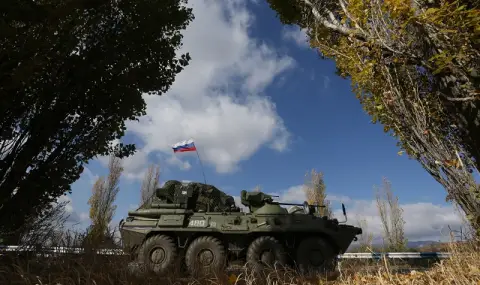Ukrainian President Volodymyr Zelensky has indicated that the delay in US security assistance has forced the country to retreat on the battlefield and will continue to threaten its defense capabilities. The Washington Post published excerpts from an interview with Zelensky on March 29, in which he stated that Ukraine would not be able to defend its territory without support, as it currently relies on the United States for armaments.
Ukrainian forces are "trying to find some way not to withdraw" from undefined front areas. They have stabilized the front near Avdeevka, Donetsk region.
Zelensky warned that Russia will use any future scenarios where Ukraine has to cede the initiative.
"If we don't take steps forward to prepare a new counteroffensive, Russia will take those steps," he said.
This is what the Institute for the Study of War (ISW) writes in its daily analysis.
Ukraine conducts rear-end strikes against Russian oil refineries for strategic effects. Zelensky said the Ukrainian strikes were in response to Russian strikes against energy infrastructure. The interview is consistent with recent statements by Commander-in-Chief Colonel-General Alexander Sirsky that Ukrainian forces are unable to fully compensate for battlefield deficiencies.
Russian missile strikes destroyed one of the largest thermal power plants (CHP) in Kharkiv Oblast on March 22. The Ukrainian electricity company Centerenergo announced on March 29 that on March 22, Russian missile strikes destroyed all power units and auxiliary equipment at the Zmiiv thermal power plant in Kharkiv region.
Russian forces conducted the largest series of combined drone and missile strikes against Ukrainian energy infrastructure on the night of March 21-22 since the start of the war.
The Russian military is reportedly forming mobile fire groups against Ukrainian drone strikes, but will likely struggle to deploy them in the near future.
The formation of the mobile fire groups indicates that Russia may not be able to deploy conventional air defense systems, such as the Panzer-S1 or S-300/400 systems, to all critical installations in western Russia. Russian forces are more likely to successfully deploy mobile groups in occupied Ukraine, where there is relatively less airspace to cover and fewer possible Ukrainian vectors for Ukrainian drone flights, than in western Russia. It appears that the Russian military has not even been able to cover important potential targets in reportedly well-protected areas in Russia.
Russian authorities have continued to escalate legal pressure against migrants since the Crocus City Hall attack on March 22, prompting both Russian authorities to increase deportations and migrants to voluntarily leave Russia. The First Department of the Russian Human Rights Project reported on March 29 that authorities in St. Petersburg have launched an anti-migrant operation and are conducting a large-scale operation to identify and deport migrants who are reported to have violated migration laws from Russia.
One of the lawyers for the First Administration said that Russian law enforcement agencies are conducting raids on hostels and apartments in St. Petersburg and that temporary detention centers in St. Petersburg are overcrowded with migrants. The lawyer said Russian authorities deported 64 foreign nationals on March 28 and estimated that Russian authorities deported enough migrants to fill two full planes that recently took off from St. Petersburg to an unspecified destination. Russian opposition publication Astra reported on March 30 that more than 400 St. Petersburg police officers and Rosgvardia personnel were involved in the operation. St. Petersburg police have checked the documents of almost 1,500 foreign nationals, issued several hundred administrative violations and opened 10 criminal cases during the operation so far.
The head of the joint press service of the city courts of St. Petersburg, Daria Lebedeva, said that the courts last week ordered the forced deportation of 418 migrants and ordered another 48 migrants (who lived in the city) to pay a fine and leave voluntarily Russia for violating migration laws. The Kremlin news channel TASS reported that Russian Federal Security Service (FSB) officers detained three Central Asian migrants accused of preparing to carry out a terrorist attack on an unspecified mass gathering in the Stavropol region.
Tajikistan's Deputy Minister of Labour, Migration and Employment Shahnoza Nodiri said Tajikistan had seen an outflow of Tajik migrants from Russia since the Crocus attack. Many Tajiks have told the authorities that they want to leave Russia out of fear and panic.
Nodiri said more people are entering Tajikistan than leaving, but that the government expects the outflow of migrants from Russia to be temporary.
Russian officials have so far charged nine people for their alleged involvement in the Crocus attack, all of whom Russian authorities have identified as citizens of Tajikistan.
The BBC News Russia Service reported on March 27 that Russian authorities had significantly increased the number of criminal cases opened for violations of migration law since the Crocus attack, particularly against citizens of Tajikistan.
Radio Free Europe/Radio Liberty (RFE/RL) reported that Russian citizens from ethnic minorities and migrants in Russia have become increasingly concerned about ethnically motivated crimes and xenophobic rhetoric since the Crocus attack, and the First Administration similarly noted that anti-immigrant and xenophobic sentiment has risen sharply in Russia since the attack.
Russia's ultra-nationalist community has stepped up its calls for anti-migrant policies, and Russian officials have recently proposed policies such as restricting migrants from entering Russia, introducing tougher penalties for crimes committed by migrants and ending the visa-free regime for Russia with Central Asian countries.
Russian President Vladimir Putin has expressed concern about heightened ethnic tensions in Russian society since the Crocus attack on March 28, and may have signaled to Russia's ultra-nationalist community that they should stop stoking ethnic tensions.
Russian authorities may try to detain more migrants to force them to sign military service contracts, given Russia's past reliance on migrants and prisoners in its crypto-mobilization campaign.
Anti-migrant policies could jeopardize Russia's cryptomobilization efforts and further exacerbate labor shortages if it deports large numbers of migrants. But the Russian authorities are unlikely to be ready to give in to the xenophobic demands of Russian ultranationalists at the expense of Russia's military efforts.
